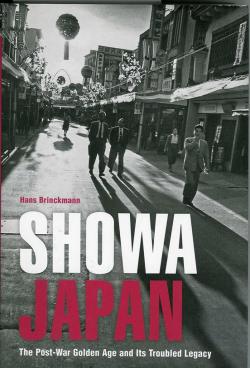Showa Japan: The Post-War Golden Age and Its Troubled Legacy

Tuttle, Tokyo and Singapore, 2008, 212 pages including index, glossary and plate section, ISBN-13:978-4-8053-1002-1
Review by Sir Hugh Cortazzi
When I began to read this book it seemed to be a walk through memory lane. Brinckman’s account of post-war Japan and the Japanese economic recovery covered familiar ground. However, for those who did not experience these years, Brinckman provides a fair picture of how Japan seemed to a sympathetic foreigner. There are few new insights but the ground has been well trodden by others.
The title “Showa Japan” might suggest that this is a history of Japan in the time of the Showa Emperor, but this is not a narrative history and the reader looking for a factual account of Japanese politics, the economy and society will not find it here.
I found the second half of the book which looks at the post-bubble years and the challenges facing Japan today more interesting, because it raises fundamental questions about how Japan may develop in the twenty-first century.
Brinckman notes the streak of “infantilism” in Japanese culture and the attraction of the “kawaii” or cute especially to young women. He found, however, an assertiveness and lack of consideration among young Japanese women, perhaps due to the fact that “Japanese women have yet to break through the glass ceiling” (Page 148).
He asks what has happened to the dreams and ambitions of the young and the tendency to acquiesce in what is prescribed by those in authority. He notes (page 121) that “The obvious downside to non-assertiveness is vulnerability to manipulation and exploitation by high-handed superiors and unscrupulous rulers. Below its façade of contentment hides a worrisome defencelessness to exterior forces, rooted to what at best is an accommodating disposition but too often can only be called indifference.” This makes his fears about a return to an assertive nationalism “by no means groundless” (page 143).
He is understandably troubled by the Japanese electorate’s tendency to vote for the status quo. “Playing upon the nostalgia, fear of uncharted waters, and the national habit of self-debasement, [though there were many examples of bureaucratic arrogance during the bubble years when some Japanese thought their country was No. 1] the sclerotic political establishment aims to exorcise the spectre of an emerging diverse society. And turn Japan into a beautiful fossil on the world’s body dynamic” (page 158). He believes that Japanese society as a whole suffers from an historic and ongoing conflict between the fervent wish to be “more like the West” and a deep-seated tendency “to isolate itself.” In Brinckman’s view Japanese society now faces “not a simple choice between collectivism and individualism, but between sticking to the static group–centred ways of the past and the dynamism of thoughtful minds set free to define their own role in a diverse society” (page 163). He fears that “the conforming, harmony-seeking, all-noses-in-the-same-direction ways of the Showa heyday still dominate this society at a time when they are no longer appropriate” (Page 194).
Before reaching this depressing conclusion Brinckman reiterates a number of criticisms of Japanese ways which have been made by others including another Netherlander Ian Buruma. I share his view about the dangers of preaching the importance of patriotism, (described by that great 18th century English pundit Dr Johnson as “the last refuge of a scoundrel”) about the need for Japan to come to terms with its past and about the importance of ensuring that the media remain really free (and not tied by the Kisha club system).
There is plenty of food for thought by the Japanese in this book, but they are unlikely to read it. Foreigners who do read the book will find its conclusions generally depressing. But all of us who pontificate from time to time about Japan should remember that generalisations about people are usually at best half truths and that fortunately even in Japan not all nails that stick out are hammered down.

